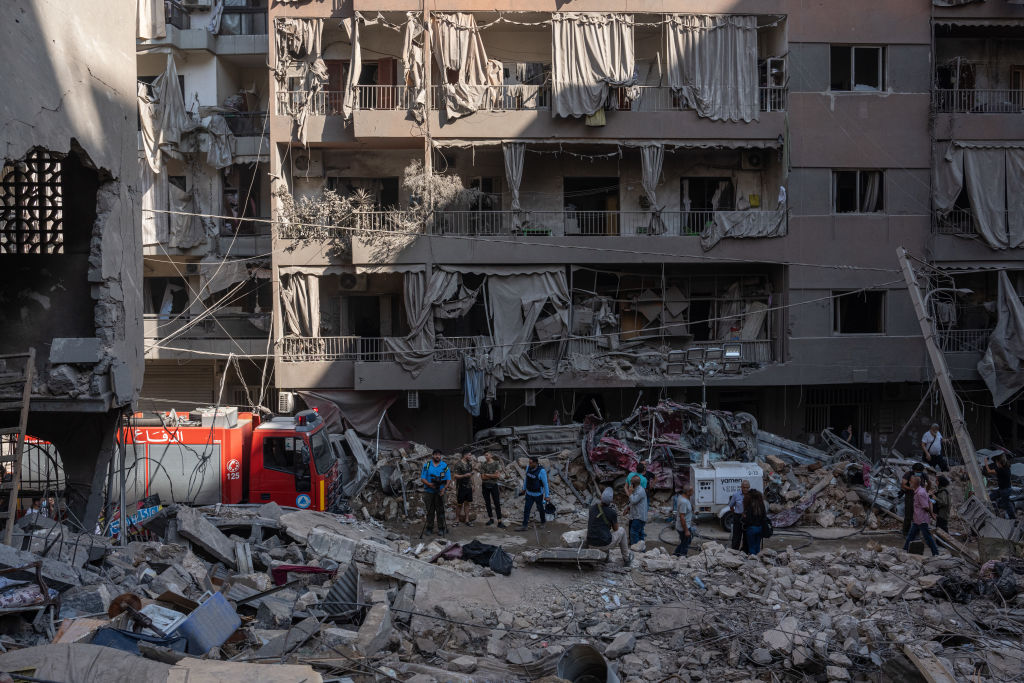The United Nations said Israeli tanks had burst into its base in southern Lebanon on Sunday, the latest accusation of Israeli violations against peacekeeping forces, as Hezbollah unleashed a deadly “swarm of drones” on an Israeli military camp.
Israel disputed the U.N. account and Israeli Prime Minister Benjamin Netanyahu called for the peacekeepers to withdraw, saying they were providing “human shields” for Iran-backed Hezbollah during an upsurge in hostilities.
The UNIFIL peacekeeping force said two Israeli Merkava tanks destroyed the main gate of a base and forcibly entered before dawn on Sunday. After the tanks left, shells exploded 100 metres (yards) away, releasing smoke which blew across the base and sickened U.N. personnel, it said in a statement.
The Israeli military said Hezbollah militants had fired anti-tank missiles at Israeli troops, wounding 25 of them. The attack was very close to a UNIFIL post and a tank helping evacuate the casualties under fire then backed into the UNIFIL post, it said.
“It is not storming a base. It is not trying to enter a base. It was a tank under heavy fire, mass casualty event, backing up to get out of harm’s way,” the military’s international spokesperson Nadav Shoshani told reporters.
In a statement, the military said it used a smokescreen to provide cover for the evacuation of the wounded soldiers but its actions posed no danger to the U.N. peacekeeping force.
Netanyahu said in a statement addressed to U.N. Secretary-General Antonio Guterres: “The time has come for you to withdraw UNIFIL from Hezbollah strongholds and from the combat zones.”
“The IDF has requested this repeatedly and has met with repeated refusal, which has the effect of providing Hezbollah terrorists with human shields.”
Hezbollah denies it uses the proximity of peacekeepers for protection.
UNIFIL’s peacekeepers “remain in all positions,” U.N. spokesperson Stephane Dujarric said in a statement issued later on Sunday, reiterating a warning from the Secretary-General that peacekeepers must not be targeted.
“Attacks against peacekeepers are in breach of international law, including international humanitarian law. They may constitute a war crime,” Dujarric said.
UNIFIL has said previous Israeli attacks on a watchtower, cameras, communications equipment and lighting had limited its monitoring abilities. U.N. sources say they fear any violations of international law in the conflict will be impossible to monitor.
U.S. Defense Secretary Lloyd Austin in a call on Sunday with his Israeli counterpart, Yoav Gallant, “reinforced the importance of Israel taking all necessary measures to ensure the safety and security of UNIFIL forces and Lebanese Armed Forces,” according to a readout of the call.
Austin also pressed Gallant on the need for Israel “to pivot from military operations in Lebanon to a diplomatic pathway to provide security for civilians on both sides of the border as soon as feasible,” it said.
FIGHTING RAMPS UP
The conflict between Israel and Hezbollah resumed a year ago when the Iranian-backed group began firing rockets at Israeli positions in support of Hamas at the start of the Gaza war and has sharply escalated in recent weeks.
On Sunday, Hezbollah said it attacked a camp of the Israeli military’s Golani Brigade camp in Binyamina in northern Israel with a “swarm of drones”.
Israel’s military said four of its soldiers were killed and seven severely injured in the incident.
Israel’s military operations in northern Gaza have also ramped up, with Palestinian authorities saying hundreds of people have been killed in the past 10 days.
Israeli tanks reached the north edge of Gaza City on Sunday, pounding some districts of the Sheikh Radwan neighbourhood and forcing many families to leave their homes, residents said.
At least 13 Palestinians were killed and several wounded in Israeli tank shelling of a school sheltering displaced families in Nuseirat in the central Gaza Strip on Sunday, medics said.
In the early hours of Monday, an Israeli air strike killed three people and wounded 40 others when it hit some tents of displaced Palestinians inside Al-Aqsa Hospital in the central Gaza Strip city of Deir Al-Balah, where a million people were sheltering, medics said.
The Middle East, meanwhile, remains on high alert for Israel to retaliate against Iran for an Oct. 1 barrage of long-range missiles launched in response to Israel’s assaults on Lebanon.
The Pentagon said on Sunday it would send U.S. troops to Israel along with an advanced U.S. anti-missile system, as Israel weighs its expected retaliation against Iran.
Washington has been privately urging Israel to calibrate its response to avoid triggering a broader war in the Middle East, officials say.
(Reuters)




















